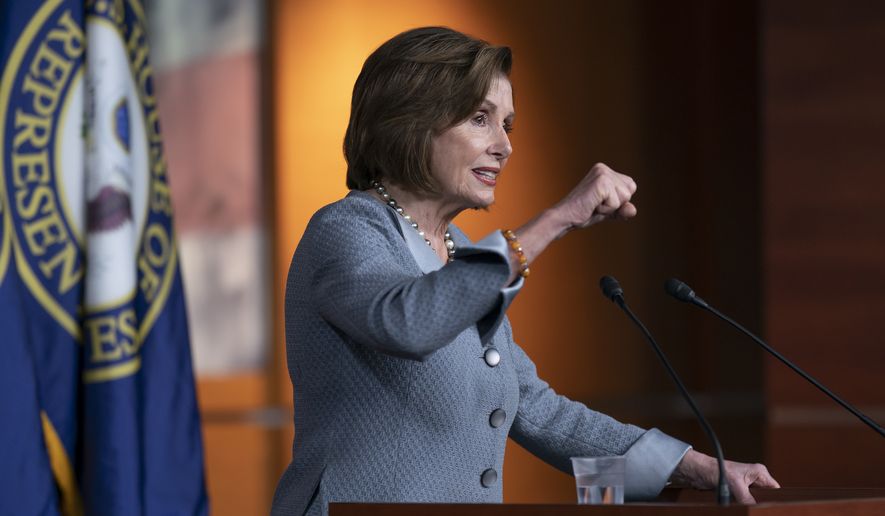Sen. Bernard Sanders says he is building a nationwide movement of people who back tuition-free college and government-run health care. But the wave bypassed the House, where Democratic leaders hope to prevent his plans from seeing daylight.
Despite pressure from some rank-and-file members, House Speaker Nancy Pelosi said she is not about to sink the Democratic majority by holding votes on bills that would expose the deep ideological split within the party.
Instead, she has pursued legislation on gun control, election reform and prescription drug price reductions — what she called “mainstream and non-menacing” legislation that can guarantee near-unanimous votes from her troops.
“We have to win in certain particular areas; we’re not about a popular vote in the country. … We are district by district,” she said.
Still, Mr. Sanders’ acolytes have tried to press their agenda.
Rep. Jimmy Gomez, California Democrat, introduced the House version of Mr. Sanders’ estate tax plan in October. The bill would lower the threshold for the tax from $11.4 million to $3.5 million and raise the top rates for those who die with more wealth.
Only 39 Democrats have signed onto the bill — far short of a majority of the caucus and nowhere near the 218 votes needed to guarantee passage.
A version of Mr. Sanders’ bill to wipe out $1.6 trillion in student loan debt and make public colleges tuition free has only 20 co-sponsors in the House.
Mr. Sanders’ Green New Deal, a project he shares with flashy freshman Rep. Alexandria Ocasio-Cortez of New York, fares better. It has nearly 100 co-sponsors in the House but still lacks majority support.
Mr. Sanders’ colleagues in the Senate also are reluctant to buy in. When Republicans, who control the upper chamber, forced a vote on the Green New Deal a year ago, it was defeated 57-0. A majority of Democrats abstained and complained that the vote was a dirty trick.
A slimmed-down Green New Deal for public housing has just 22 co-sponsors with Ms. Ocasio-Cortez in the House. Mr. Sanders has just two Democratic colleagues — Sens. Jeff Merkley of Oregon and fellow presidential candidate Elizabeth Warren of Massachusetts — on board in the Senate.
House Democrats have granted a hearing on Mr. Sanders’ signature “Medicare for All” health care bill, but the legislation won’t make it to the floor if the party’s less liberal members have a say.
Mr. Sanders’ platform is a loser for the swing-district Democrats who delivered a House majority for the party in 2018, said Rep. Tom Malinowski of New Jersey.
“Why would we risk this extraordinary opportunity by nominating somebody who has a tendency to divide our own side?” asked Mr. Malinowski, a Democrat who in the 2018 midterm elections captured a Jersey district that President Trump won in 2016. “Our focus here is continuing to pass bills and to continue to present to the American people what we think a part of the Democratic Party stands for, which is pragmatic legislation.”
Mrs. Pelosi has said she would be comfortable with Mr. Sanders at the top of the Democratic ticket in November, but she is careful to carve out space between the presidential campaign and her agenda on the House floor.
“It’s not unusual for the party platform or the candidates for president to have their own agenda that they would put forth. And it’s not unusual for the House of Representatives to have its agenda as well,” she said. “The presidential is its own race.”
At the same time, Mrs. Pelosi has made sure her troops don’t take votes that would embarrass Mr. Sanders. Democrats headed off a Republican attempt last week to force action on a resolution chastising Mr. Sanders for his comments praising the education system under communist Cuban dictator Fidel Castro.
Liberal Democrats say Mr. Sanders is shaping the debate even without House votes on his plans.
“The water is warm, and it feels really good to be on the front lines of pushing for change that helps working people across the country,” said Rep. Pramila Jayapal, Washington state Democrat and a leader of the Congressional Progressive Caucus. “In addition to Bernie Sanders really winning [the] first three contests in kind of remarkable ways, I think Medicare for All has been a big winner in spite of the incredible amount of resistance coming at us.”
Her co-chairman, Rep. Mark Pocan of Wisconsin, said the agenda Mrs. Pelosi is pursuing is already remarkably left-leaning, including a major rewrite of election laws and a bill to force reductions in pharmaceutical prices.
He also saw positive signs in Mrs. Pelosi’s pursuit of a unity agenda.
“I think that’s a signal for people to chill,” he told The Washington Times. “And you know, really embrace the fact that if Bernie is the nominee, he’s the nominee for a reason, right? Because he’s resonating with voters. And we would be wise to resonate with voters on those same issues.”
But moderates point out that Mr. Sanders’ voters are the most liberal elements of the Democratic electorate — not the moderate to conservative voters who populate the swing districts that will determine control of the House in November.
They also cast doubt on whether Mr. Sanders would get his plans through Congress even as president.
“Nothing is going to be easy,” said Rep. Gilbert Ray Cisneros Jr., who represents a swing district in California. “The president comes in, he’s going to have to work with Congress. You have 435 members in the House who have their own ideas for what’s best, and he’s going to have to work with us in order to move forward in the agenda that’s going to be best for the American people.”
• Gabriella Muñoz can be reached at gmunoz@washingtontimes.com.




Please read our comment policy before commenting.